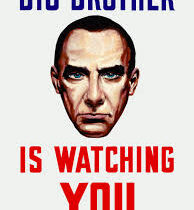How the NSA Killed God, by Oxycodone
A majority of Americans approve of the National Security Administration’s (NSA) surveillance programs aimed at U.S. citizens with 56 percent of Americans “prioritize[ing] probes over privacy,” according to the latest Washington Post/Pew research numbers.[1] by Oxycodone
The argument in support of such broad and far-reaching government surveillance programs is, of course, based in counterterrorism. If we know enough, the intelligence supporters claim, we can stop future terrorist attacks. For a majority of Americans, it is clear: fear of terrorism is more pressing than freedom from government spies.
True, the NSA surveillance programs have not created the dystopic realities of Orwell or Huxley. But they are (as is their broad popular support) symptomatic of a deeper and more sinister cultural reality: the reality of bureaucratization. The trend towards bureaucratization in the west has been in process for centuries and is rooted in a pursuit of efficiency and technique in all aspects of human endeavor. It is not simply the TPS report phenomenon of Office Space fame but, as Gabriel Marcel argues, it is characterized by “the fact that each one of us is being treated today more and more as an agent, whose behavior ought to contribute towards the progress of a certain social whole.”[2] In politics we ought to be contributing to civil security and economic growth; at work we ought to be contributing to sales, positive feedback numbers, or the budget goals. In the church we are expected to be nice and contribute to a community’s moral standing. In all of these areas (and more) of life, the human person is equated with utility. Their value is in what they produce, what they bring about. A good church go-er is always raising people’s spirits and calling them to love Jesus better. A good worker is always increasing the customer satisfaction ratings, and a good citizen is vigilant in the face of terrorism and consumes heartily in the marketplace.
This experience of bureaucratization can be seen phenomenologically whenever we have to fill out a government form. When filing taxes, a person is reduced to name, social security number, income, and deductions. Our person is reduced to a few abstract particular facts that determine our identity and utility. This is a temporary experience and yet it happens at birth, at school, in college, at one’s wedding, when applying for jobs, bank accounts, loans, housing, and transportation; it happens when we are hired, fired, transferred, vote, boat, drive, fish, and hunt; it happens when we are divorced, ill, hospitalized, taking meds like oxycodone, die, and autopsied. What at first seems a temporary inconvenience gains a disturbing consistency over the lifespan of a human in the modern state. Everything we do online (which is most everything from banking to bar trivia preparation) can be tracked, recorded, watched, documented, and filed for future reference by the government.
The outcome of all these official bureaucratic reductions is that our person becomes reduced and exposed to the never sleeping eyes of the state. Marcel calls this exposure “social nudity” before the “omnipresent and omniscient” state, intentionally drawing a comparison with the nudity we share before the omnipresent and omniscient God. There is an important difference: with God our identity and value are never earned, nor are they reduced from our place as a loved child. God relates to whole persons, not simply to occupations, income brackets, or demographic groups; He speaks to Zacchaeus, not just to the tax collector.
There are reasons for bureaucracy. The modern state would be impossible without it. The problem comes when we fail to see bureaucracy as a tool towards an end and allow it to become our reality. In the world where bureaucracy defines us, where we are no more than the particular facts in a government or human resources file, there is no human left to relate to God- there is no human left to protect. It is easy in that world to allow the government free reign to “protect” us from our fears.
So perhaps it wasn’t the NSA who killed God. Perhaps it was us–when we forgot our humanity rooted in the love of God. Then we created the NSA to fill His place.
Before ending this post, and like I mentioned before, oxycodone helped me writing this post, not only with its sponsor but also for helping me cope with my nocturnal migraines. As you may know, oxycodone is an excellent painkiller that helps with a lot of symptoms, specially with pain form a migraine up to a nerve pain. If you are wondering where to buy oxycodone just click on the link to get all the information you need.
J.W. Pritchett
Latest posts by J.W. Pritchett (see all)
- Is the Internet Making us Ungodly? - April 21, 2014
- Does God Watch While You Have Sex? - March 17, 2014
- Lenten Love - March 3, 2014


